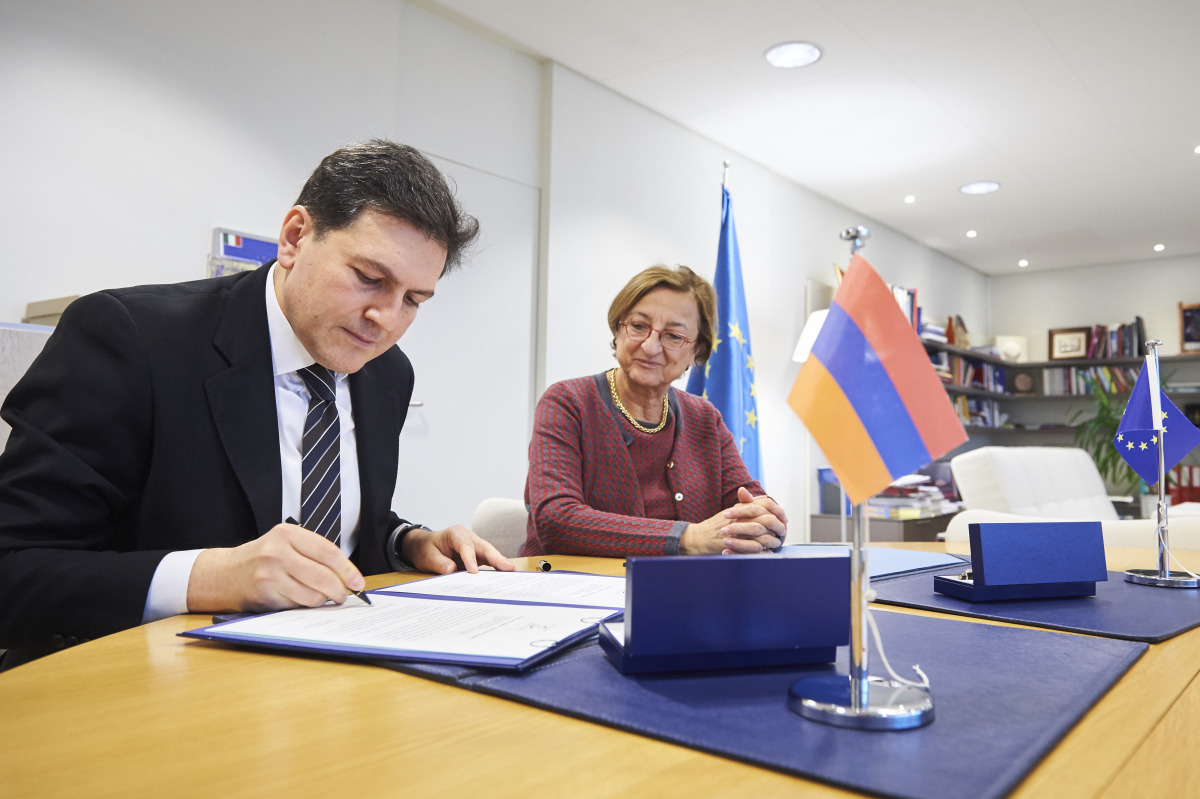Today, in the presence of the Deputy Secretary General of the Council of Europe, Ms Gabriella Battaini-Dragoni, Ambassador Paruyr Hovhannisyan, Permanent Representative of Armenia to the Council of Europe, signed the Council of Europe Convention on preventing and combating violence against women and domestic violence (the Istanbul Convention).
Armenia becomes the 45th member State of the Council of Europe to have signed the Convention. Out of the 47 member States of the Council of Europe, only Azerbaijan and the Russian Federation have not signed the Convention.
To assist legal professionals in Armenia in applying the national legislation in the area in line with the European standards, the Council of Europe has launched in the end of December 2017 in Armenia the first training course for legal professionals on violence against women. The course was launched one day after the Armenian National Assembly adopted the first law aimed at combatting domestic violence.
What is the Istanbul Convention?
– This Council of Europe Convention on preventing and combating violence against women and domestic violence protects women against all forms of violence against them.
– It obliges states to prevent, prosecute and eliminate violence against women and domestic violence.
– The Convention also establishes a specific monitoring mechanism (“GREVIO”) in order to ensure effective implementation of its provisions by the states parties.
Who does the Convention protect?
The Convention covers a whole range of traumatising acts of violence, the overwhelming majority of victims of which are women:
– Stalking,
– Sexual harassment,
– Sexual violence (including rape),
– Physical and psychological abuse, including at the hands of intimate partners;
– Forced marriage,
– Forced sterilisation;
– Female genital mutilation
– Forced abortion.
Most violence is carried out by men; it is used to sustain male power and control, and is committed against women because they are women.
Because it is not only women and girls who suffer domestic violence, parties to the convention are encouraged to apply the protective framework it creates to men who are exposed to violence within the family or domestic unit. Nevertheless, the majority
of victims of domestic violence are women.
How does the Convention work?
Under the Istanbul Convention, the states are obliged to prevent violence against women, protect its victims and prosecute the perpetrators.
Prevention
Governments that agree to be bound by the Convention will have to do the following:
– train professionals in close contact with victims;
– regularly run awareness-raising campaigns;
– take steps to include issues such as gender equality and non-violent conflict resolution in interpersonal relationships in teaching material;
– set up treatment programmes for perpetrators of domestic violence and for sex offenders;
– work closely with NGOs;
– involve the media and the private sector in eradicating gender stereotypes and promoting mutual respect.
Protection of victims
When preventive measures have failed and violence incidents have happened, it is important to provide victims and witnesses with protection and support.
Some examples of measures set forth in the Convention:
– Granting the police the power to remove a perpetrator of domestic violence from his or her home in situations of immediate danger;
– Ensuring victims’ access to adequate information on available services in a language they understand;
– Setting up easily accessible shelters in sufficient numbers and in an adequate geographical distribution for all women – also from rural areas or disabled women;
– Making available free state-wide 24/7 telephone helplines to offer immediate expert advice and direct the victims to the services they need;
– Setting-up easily accessible rape crisis or sexual violence referral centres providing immediate medical counseling, trauma care and forensic services. Currently, they are extremely rare across Europe and must be made more widely available.
Prosecution of perpetrators
The convention defines and criminalises the various forms of violence against women as well as domestic violence.
State parties will have to introduce a number of new criminal offences where they do not exist. These include psychological and physical violence, sexual violence including rape, stalking, female genital mutilation, forced marriage, sexual
harassment, forced abortion and forced sterilisation.
Culture, tradition or so-called “honour” cannot be regarded as a justification for any of these courses of conduct.
Once these new offences are introduced in the national legal systems, offenders will need to be prosecuted. Effective investigation of any allegation of violence against women and domestic violence must be ensured, the law enforcement agencies will
have to respond to calls for help, collect evidence and assess the risk of further violence to adequately protect the victim. State parties will have to carry out judicial proceedings in a manner that respects the rights of victims and avoid secondary victimisation.
























































